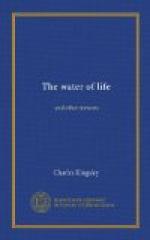Does not all law imply a will? Does not an Almighty Will imply a special providence?
But these are questions for which most persons have neither time nor inclination. Indeed, the whole matter is unimportant to them. They have no special need of a special providence. Their lives and properties are very safe in this civilized country; and their secret belief is that, whatever influence God may have on the next world, He has little or no influence on this world; neither on the facts of nature, nor on the events of history, nor on the course of their own lives; and that a special providence seems to them—if they dare confess as much—an unnecessary superstition.
Only poor folk in cottages and garrets—and a few more who are, happily, poor in spirit, though not in purse—grinding amid the iron facts of life, and learning there by little sound science, it may be, but much sound theology—still believe that they have a Father in heaven, before whom the very hairs of their head are all numbered; and that if they had not, then this would not only be a bad world, but a mad world likewise; and that it were better for them that they had never been born.
Nevertheless, it is difficult to believe in the special providence of our Father in heaven. Difficult: though necessary. Just as it is difficult to believe that the earth moves round the sun. Contrary, like that fact, to a great deal of our seeming experience.
It is easy enough, of course, to believe that our Father sends what is plainly good. Not so easy to believe that He sends what at least seems evil.
Easy enough, when we see spring-time and harvest, sunshine and flowers, to say—Here are ‘acts of God’s providence.’ Not so easy, when we see blight and pestilence, storm and earthquake, to say,— Here are ‘acts of God’s providence’ likewise.
For this innumerable multitude of things, of which we now-a-days talk as if it were one thing, and had an organic unity of its own, or even as if it were one person, and had a will of its own, and call it Nature—a word which will one day be forgotten by philosophers, with the ‘four elements,’ and the ’animal spirits;’—this multitude of things, I say, which we miscall Nature, has its dark and ugly, as well as its bright and fair side. Nature, says some one, is like the spotted panther—most playful, and yet most treacherous; most beautiful, and yet most cruel. It acts at times after a fashion most terrible, undistinguishing, wholesale, seemingly pitiless. It seems to go on its own way, as in a storm or an earthquake, careless of what it crushes. Terrible enough Nature looks to the savage, who thinks it crushes him from mere caprice. More terrible still does Science make Nature look, when she tells us that it crushes, not by caprice, but by brute necessity; not by ill-will, but by inevitable law. Science frees us in many ways (and all thanks to her) from the bodily terror




